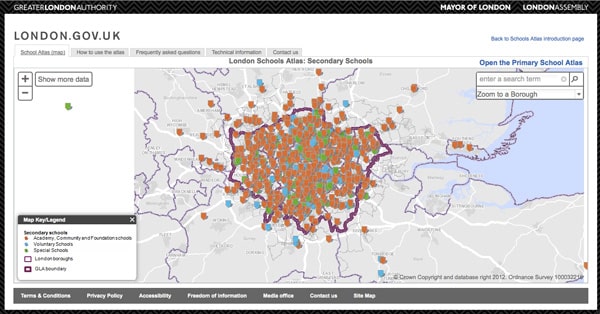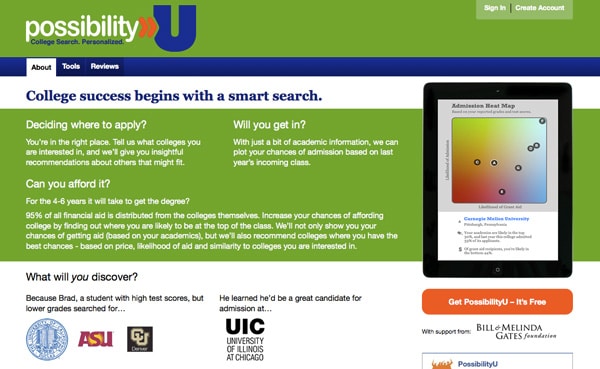How will online school selection services affect education agents?
At ICEF Monitor, we have written before about how educators can power their recruitment and programming strategies via the astute collection, management, and analysis of data on the behaviours and patterns of students. Today, we look at examples of online data sites and services available to students researching their education options, and we consider the question:
"How will the expanding field of online information and school selection resources affect the role played by education agents?"
Info, info, everywhere
The London Schools Atlas is a great place to start in our consideration of the data-enabled online tools now available to students and their families researching educational choices. The Atlas is an interactive online map that reveals:
- The location of London primary and secondary schools (as well as their associated catchment areas);
- Their current patterns of attendance;
- Potential future demand for places in them.

As one of its creators said in the following BBC news video, the Atlas is designed to simplify the decision-making process for families; all the information comprised in the map is available in various other places but has not – until now – been contained in a single, easy-to-understand location and application. In other words, the London Schools Atlas compiles multiple data points and presents them in a single place to highly motivated parents. It is this function and value – compiling and simplifying complex processes or information – that many other student and parent-targeted apps and sites also aspire to. This compilation and simplification service is also, in many respects, a traditional function of the education agent or other trusted intermediaries in international education. Another compelling data project is the US-based website Possibility U, which is based on an algorithm that helps high school students discover colleges they might not even know exist. Possibility U:
“ … asks users to enter up to three colleges that they are interested in. It then spits out a list of 10 other, similar colleges to consider. A premium paid subscription allows students to compare an unlimited number of colleges and provides application deadlines and other advice.”

Possibility U mimes the way students think (e.g., “I know this college, and I like what it has to offer, but I want to see if there are other, similar options that suit my goals and budget even better.”). Its algorithm was developed using data based on real human inputs on what matters to students when they choose a university, and this is what makes it so interesting. Then, there is – as we have reported previously, LinkedIn University Pages, launched last year. University Pages allows institutions to share more of their data – such as alumni success stories – to give students more robust information with which to consider them. With University Pages, students as young as 13 can:
- Access campus news and activities, ask questions of the school, engage with current students and alumni;
- Research the careers of graduates of various universities and see which have produced notable alumni;
- Network post-graduation with classmates for professional purposes.
University Pages is a good example of the way data is helping institutions and students to connect more directly and organically. By sharing information on LinkedIn, students and institutions – theoretically at least – have a better chance of matching themselves to each other. And again, student-institutional matchmaking has traditionally been a strong selling point for agents.
So, where does this place the agent?
Many agents watch the emergence of such school selection products carefully. And for some, the question naturally arises as to whether the increasing range of student information resources online could change or reduce the role played by education agents. As it stands now, savvy agents are locating the best data tools, apps, and sites for their target markets and using them to help students to leverage, rather than be replaced, by data. (For example, agents could use the London Schools Atlas and Possibility U very much to their own advantage right now – employing these tools in their services to students and families.) But it is no doubt also true that some students will find the information and services they need online and that this may reduce or eliminate their need for additional support or services from an agent. Technology is a dramatic and often disruptive change agent in many industries, and one that requires a thoughtful and strategic response. The travel industry is a good example, and one with some parallels to international education, of a business that has been dramatically affected by technological change. It also provides some important lessons for responding and adapting to new challenges (and opportunities) in a rapidly changing marketplace.
Disintermediation in the travel industry
In the face of dramatic technological or other structural change, any industry can be at risk for "disintermediation," a process in which, according to O’Reilly Media:
“… a middle player poised between service or product providers and their consumers is weakened or removed from the value chain.”
In the case of the travel industry, for example, there are still travel agencies, but far fewer than before the creation and wide use of sites such as Travelocity and Expedia. Those that have survived have adapted and changed their services. In this Portland Herald article about travel agencies that remain – and thrive – one agency owner commented, “The Internet is the best thing that’s ever happened.” The article notes that some agencies are capitalising on the fact that because of the Internet,
“Potential customers are now much more informed about the costs and destinations they're interested in, which helps travel agents have higher closure rates and design better itineraries for their customers.”
Another owner has chosen the route of specialisation – focusing on certain target markets and the delivery of astute travel counselling. He says:
"We're consultants. You have to get to know your clients, spend time with them, figure out what they like, and then use your knowledge to make sure they have the best experience possible."
This owner adds that "[travel review and booking] sites aren't policed very rigorously" and uses his in-depth knowledge to add a level of security to customers buying holidays. The article also notes that successful travel agencies are there when customers need them – when something has gone awry with their flight or trip, for example. Another article, this time from Business Insider, notes simply that, “being able to add value to computers is the way forward.”
Smart agents can change and thrive
The Business Insider article contends that our knowledge economies are increasingly creating an upper tier of wealthy earners and consumers. In many markets, these consumers include internationally mobile students and their families. Consumers like these will be willing to pay a premium for personalised, extra services… the human touch and on-the-ground expertise that education agents can provide that online information services simply cannot. Education agents can add more comfort and security to a complex, high-stakes consumer decision-making process such as where to study abroad than data services alone can do. The trick, going forward, will be:
- to assess demand for value-added services;
- to provide them at the right price to the right markets;
- to use the new data and information services out there to boost the quality of service to students and parents;
- to innovate, embrace, and harness the power of technology in order to provide a valued, relevant service.
If you have a comment about your own experience as an agent and the increasing use of online information and data-driven services for students researching study abroad, we’d love to hear from you in the comments section below.
Most Recent
-
Australia: Full-year data for 2025 reveals impact of AUD$2,000 study visa application fee on ELICOS sector Read More
-
Germany’s foreign enrolments continued to grow in the 2025/26 academic year Read More
-
Survey highlights a growing “engagement gap” between international student expectations and institutional response Read More
















